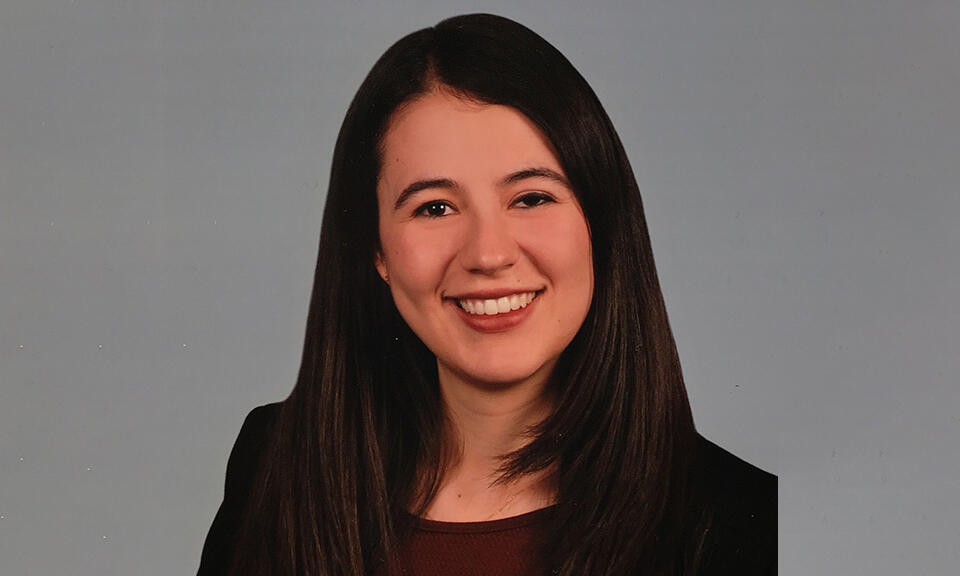Laura Buenaventura Castillo

“If you want to contribute to building up a sustainable inclusive future and learn from academic and industry perspectives, this programme is for you. I really encourage everyone interested in sustainability, green finance, climate change impacts and technological solutions to join the programme.”
What work experience/internships did you have before beginning with Imperial Business School?
After I graduated from university, I worked for a sustainability consulting firm in Colombia, called CO2CERO. I spent the first six months with the company in an internship where I was tasked with creating an internal sustainability report following GRI standards. I then spent the next two years working as a sustainability analyst where I actively planned and implemented sustainability frameworks for measuring the climate impact of clients across different sectors (from food production to fuel distribution). I worked on more than 30 projects aimed to estimate corporate carbon footprint. In addition, I delivered environmental awareness training to more than 1,000 people. I also contributed to the implementation of the first regional emission trading system in Colombia.
My next role brought me to work in the public sector. I worked for the National Civil Registry, an independent body that collects and stores the vital statistics and identifying information of all citizens, issues and distributes the national ID cards, and oversees regional and national elections. I assessed the environmental performance of 32 state offices to ensure regulatory compliance while also leading environmental education programmes for public servants from all over the country.
Why did you decide to study MSc Climate Change, Management & Finance at Imperial Business School?
Colombia is listed as one of the world's most diverse countries, hosting around 10% of the planet's biodiversity. It is also one of the most vulnerable territories to climate change, even though the country is responsible for only 0.35% of the world’s total emissions. We are aware of the enormous challenges ahead and the great responsibility we have to act now.
In this context, I decided to join the MSc Climate Change, Management & Finance programme to gain valuable skills that would help me protect my country from the threat of climate change. It integrates the latest research with practical knowledge on issues related to climate change and sustainability. I have the opportunity to learn from world-class academics and industry matter experts. The programme is helping me to achieve my full academic potential and to be prepared for future challenges.
Did you receive a scholarship? What is your advice to future students applying for scholarships?
I had the honour of being awarded the British Council scholarship for Women in STEM. This is a fully funded scholarship that aims to increase opportunities in STEM for underrepresented girls and women. This year, in its first edition, the programme awarded 115 women worldwide, and 48 from Latin America. The main benefits of the scholarship are the opportunity to study at UK universities that are world leaders in STEM subjects with all the funding required, which included tuition fees, a monthly stipend, student visa, NHS levy, English language certificate and return flight. I also join a network of talented women from all over the world that want to contribute to reducing inequalities in their home countries and build better realities. I am so grateful and honoured to represent Latin American women and to be able to inspire future generations of Colombian girls and women to pursue careers in STEM.
Which has been your favourite module so far and why?
I enjoyed all the modules taught by lecturers from the Grantham Institute, which are mainly science-related classes. The Science of Climate Change module helped me to understand the scientific basis and the urgency of climate change. The Mitigating Climate Change module is addressing relevant initiatives to reduce greenhouse gas emissions.
I also found the Carbon Accounting and Sustainable Management & Strategy projects very useful and practical. We were requested to design a net-zero plan and rebuild a sustainable strategy for companies in different sectors. Both are group assignments that develop communication, problem-solving and time management skills - all valuable career competencies.
What has been the most rewarding part of the programme?
Learning about the initiatives from all around the world that can be applied in my home country. Colombia has many challenges ahead, so learning from different from world-class academics and industry experts about climate change perspectives is really rewarding.
What has been the most challenging part of the programme?
The programme is highly demanding, mainly during exams. It is particularly important to correctly manage my time since it has a high workload and tight deadlines during the term. In my case, the financial modules have been really enriching but also challenging since I do not have a background in finance.
However, the most challenging aspect has definitely been living abroad by myself and studying in English for the first time. Fortunately, as the cohort is very diverse and full of emphatic people, I have always found support in my colleagues. Moreover, Imperial Business School has many services to support students in overcoming their challenges. For example, the Student Counselling and Mental Health Advice Service or the Senior Tutor can help you during hard times.
What clubs, societies or other activities have you been involved in at Imperial? Do you hold a student leadership position?
I am the cultural and social event director at the Latin America Business Club. I am a member of the Skate Society, Latin America Society, and Women in SET, and a Student Ambassador for my programme
Have you had opportunities to work/socialise with students across programmes within the Business School?
We have had two main social events with colleagues from other Specialised Master’s programme from the Imperial Business School - the Halloween party and Chinese New Year, with delicious food, drinks, and music. All these events have been organised by the social leaders of each programme, who are all doing an excellent job. During the spring term, our social leader is also preparing a diverse array of activities, such as an overnight trip during a weekend, a yoga class during wellness day and a visit to Kew Gardens.
I am also working with students in the Latin America business club to promote the region with all the Business School students.
What are your future career goals?
I would like to work for the Colombian Ministry of Environment and Sustainable Development supporting climate change policy. I would also like to work for NGOs that support Latin America’s transition to a more resilient, inclusive, and sustainable future.
How did the services from Careers help you in your professional development?
The one-to-one appointments offered by the Careers team supported me to find my future career pathway and improve the English skills required to work in the UK. They also offer a wide selection of workshops, and fairs with companies from many sectors.
Do you think studying in a central location such as London is beneficial for networking and career opportunities?
Absolutely. Studying in London, as one of the world cultural, business, and financial centres is very beneficial for networking. Many of the companies based in London are leaders in sustainability and climate change action and are full of diverse people. You are always going to find someone that has something in common with you to connect with, whether that’s someone from the same country, speaks the same languages as you, or has similar life experiences, career goals or general interests.
Looking back to when you were applying for the programme, did you attend any online webinars or on-campus information sessions?
I attended three sessions organised by Imperial Business School. The first one was the MSc Climate Change, Management & Finance information session, where I was able to familiarise myself with the general insights of the programme. During the meeting, there were three Student Ambassadors invited, who gave their perspectives and answered all the questions I had at the time. Once I received the official offer, I attended two visa information sessions to clear up all the questions I had about the process. All these sessions are very useful, and I would highly recommend future students to attend as many events as possible, either online or in person.
What advice would you give someone who is thinking about applying for the programme?
Studying at Imperial Business School with the support of the British Council Women in STEM scholarship has been a dream. My life is now full of incredible challenges that are continuously contributing to my personal and professional growth. If you want to contribute to building up a sustainable inclusive future and learn from academic and industry perspectives, this programme is for you. I really encourage everyone interested in sustainability, green finance, climate change impacts and technological solutions to join the programme. If funding is a problem, try to look for all the scholarships available. The Business School have several options, including for underrepresented communities.
Related blogs
Meet the Specialised Masters’ Class of 2026
Hear from Imperial Business Specailised Masters's students 2025-2026

From Imperial to Impact
Hear from an MSc Climate Change, Management & Finance graduate on his journey, career support, and sustainability insights.
Imperial’s Extended term: enhanced flexibility for your programme
Enhance your Master’s or Full-Time MBA experience with our 16-month Extended term. Gain valuable real-world experience through an extended Work Placement or Global Exchange, strengthening your career credentials and expanding your professional network.


